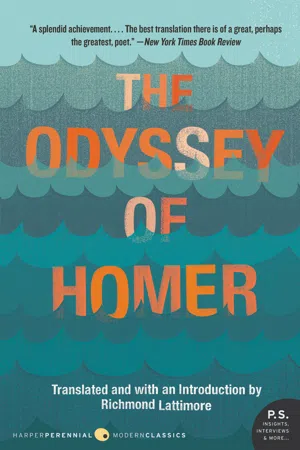
- 400 pages
- English
- ePUB (mobile friendly)
- Available on iOS & Android
The Odyssey of Homer
About this book
Homer’s great epic The Odyssey—one of Western literature’s most enduring and important works—translated by Richmond Lattimore
“A splendid achievement. . . the best translation there is of a great, perhaps the greatest, poet.” — New York Times Book Review
A classic for the ages, The Odyssey recounts Odysseus’ journey home after the Trojan War—and the obstacles he faces along the way to reclaim his throne, kingdom, and family in Ithaca.
During his absence, his steadfast and clever wife, Penelope, and now teenaged son, Telemachus, have lived under the constant threat of ruthless suitors, all desperate to court Penelope and claim the throne. As the suitors plot Telemachus’ murder, the gods debate Odysseus’ fate. With help from the goddess Athena, the scattered family bides their time as Odysseus battles his way through storm and shipwreck, the cave of the Cyclops, the isle of witch-goddess Circe, the deadly Sirens’ song, a trek through the Underworld, and the omnipresent wrath of the scorned god Poseidon.
An American poet and classicist, Richmond Lattimore’s translation of The Odyssey is widely considered among the best available in the English language. Lattimore breathes modern life into Homer’s epic, bringing this classic work of heroes, monsters, vengeful gods, treachery, and redemption to life for modern readers.
Frequently asked questions
- Essential is ideal for learners and professionals who enjoy exploring a wide range of subjects. Access the Essential Library with 800,000+ trusted titles and best-sellers across business, personal growth, and the humanities. Includes unlimited reading time and Standard Read Aloud voice.
- Complete: Perfect for advanced learners and researchers needing full, unrestricted access. Unlock 1.4M+ books across hundreds of subjects, including academic and specialized titles. The Complete Plan also includes advanced features like Premium Read Aloud and Research Assistant.
Please note we cannot support devices running on iOS 13 and Android 7 or earlier. Learn more about using the app.
Information
Glossary
- Achai'ans:
- The most general term for “Greeks,” including the people of Ithaka, i.90; ii.7, etc.
- A'cheron:
- River in the land of the dead, x.514.
- Achil'leus:
- The great hero of the Iliad, whose ghost talked to Odysseus, xi.467, etc.
- Adres'te:
- Handmaid of Helen, iv.122.
- Agamem'non:
- Leader of the expedition against Troy, murdered by Aigisthos, i.30; iii.143, etc.
- Agela'os:
- Son of Damastor, a suitor, xx.321, etc.; killed by Odysseus, xxii.293.
- Aiai'a:
- Circe's island, x.135.
- Ai'akos:
- Father of Peleus, grandfather of Achilleus, xi.471, 538.
- Ai'as:
- (1) Son of Telamon, who quarreled with Odysseus over the armor of Achilleus, xi.469, etc.; (2) son of Oïleus, drowned by Poseidon, iv.499-510.
- Aie'tes:
- Brother of Circe, x.137; xii.70.
- Ai'gai:
- City in Achaia, favored by Poseidon, v.381.
- Aigis'thos:
- Son of Thyestes, lover of Klytaimestra and murderer of Agamemnon, killed by Orestes, i.29; iii.194, etc.
- Aigyp'tios:
- Elder of Ithaka, father of Eurynomos, ii.15.
- Aigy'ptos:
- The river of Egypt, the Nile, xiv.257.
- Aio'lia:
- The island of Aiolos (1), x.1.
- Ai'olos:
- (1) Mortal king in charge of the winds, x.1; (2) father of Kretheus, xi.237.
- Ai'son:
- Son of Tyro and Kretheus, xi.259.
- Aithio'pians:
- The Ethiopians, a distant people visited by Poseidon, i.22; v.282, etc.
- Ai'thon:
- Name assumed by Odysseus in conversation with Penelope, xix.183.
- Aito'lia:
- Country in central Greece, xiv.379.
- Akas'tos:
- A king in western Greece, xiv.336.
- Akro'neos:
- A Phaiakian, viii.111.
- Ak'toris:
- Maid of Penelope, xxiii.228.
- Alek'tor:
- A Spartan, whose daughter married Megapenthes, iv.10.
- Alkan'dre:
- Lady of Thebes in Egypt, wife of Polybos (2), iv.126.
- Al'kimos:
- Father of Mentor, xxii.234.
- Alki'noös:
- King of the Phaiakians, vi.12; vii.185, etc.
- Alkip'pe:
- Handmaid of Helen, iv.124.
- Alkmai'on:
- Son of Amphiaraos, xv.248.
- Alkme'ne:
- Mother of Herakles, ii.120; xi.266.
- Alo'eus:
- Husband of Iphimedeia, putative father of Otos and Ephialtes, xi.305.
- Alphei'os:
- River in the western Peloponnese, iii.489.
- A'lybas:
- City of unknown location from which Odysseus pretended to have come, xxiv.304.
- Amni'sos:
- A place in Crete, xix.188.
- Amphi'alos:
- A Phaiakian, winner in jumping, viii.114; 128.
- Amphiara'os:
- Son of Oïkles and grandfather of Theoklymenos. He was one of the seven against Thebes, xv.244-247.
- Amphi'lochos:
- Son of Amphiaraos, xv.248.
- Amphi'medon:
- One of th...
Table of contents
- Cover
- Title Page
- Dedication
- Contents
- Introduction
- Book I
- Book II
- Book III
- Book IV
- Book V
- Book VI
- Book VII
- Book VIII
- Book IX
- Book X
- Book XI
- Book XII
- Book XIII
- Book XIV
- Book XV
- Book XVI
- Book XVII
- Book XVIII
- Book XIX
- Book XX
- Book XXI
- Book XXII
- Book XXIII
- Book XXIV
- Glossary
- About the Author
- Praise
- Copyright
- About the Publisher